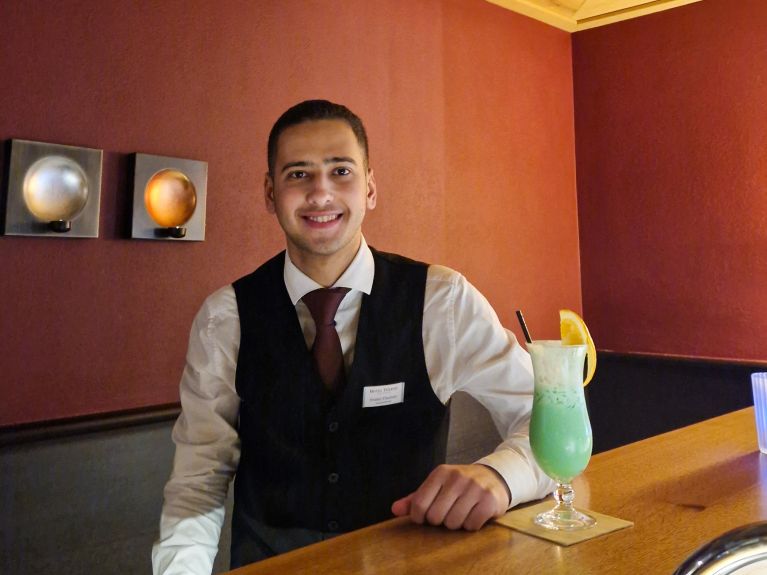From the Red Sea to the Black Forest – Khaled Elbarbary’s life in Germany
Qualified staff from abroad are also in demand in Germany’s hotel sector. Let us introduce you to a young Egyptian who works in the Black Forest.

“People here speak Swabian,” remarks Khaled Elbarbary with a smile. The Egyptian already began learning German in his home town of Alexandria. Although he likes the sound of this southern German dialect, he finds it difficult to understand. “Some people cannot speak or refuse to speak standard German, and I don’t yet understand the Swabian dialect.” But he’s working on it. Elbarbary is enrolled in a hospitality training programme in Bad Teinach, a climatic spa town in Germany’s southwestern state of Baden-Württemberg.
Dieses YouTube-Video kann in einem neuen Tab abgespielt werden
YouTube öffnenThird party content
We use YouTube to embed content that may collect data about your activity. Please review the details and accept the service to see this content.
Open consent formAfter leaving school and acquiring a number of years of vocational experience, Elbarbary had looked into the possibilities of training in the hotel sector in Egypt. Through the German embassy he discovered that the Deutsche Gesellschaft für Internationale Zusammenarbeit (GIZ) awards scholarships, so he applied - and was successful. And off he went, swapping the Egyptian riviera for the idyllic forests of Germany.
During his extensive training programme in the Black Forest town near Stuttgart, Elbarbary spends periods working in the different areas of a hotel, from the restaurant and catering department to room service. Best of all he likes working at the front desk - at the heart of the hotel. “The reception is the most important place in a hotel. That’s where everything has to be organised, such as the check-in and check-out. And it’s where you can chat to the guests.”
Further opportunities after training
He already has experience of working in hotels at the east Egyptian coastal resorts of Hurghada and Marsa Alam on the Red Sea. What he appreciates about working in German hotels is the structured approach. “Everything is well organised here. Everyone knows what their duties are, which makes the work easier.” He also likes the opportunities for doing further and continuing training in the German tourism industry. “Once you’ve completed your training you have to work for a few years, and then you can train as a master hotel professional or study business administration. There are always opportunities.”

Elbarbary also appreciates the regular working hours and the free days he enjoys at the weekend during his training. “Once you have worked five days, you get two days off.” Then he likes to play football at his local club. Or he sets off to explore Germany, which is becoming increasingly familiar to him. For example, he enjoys city breaks in places like Berlin, Nuremberg or Frankfurt am Main, and has already visited neighbouring countries such as the Netherlands and Switzerland. Since he originally comes from Alexandria, a major port city with a population of five million, Heidelberg is currently his favourite destination – a more tranquil place than any of Germany’s big cities. “There’s a beautiful castle there. The city looks great and is so clean.”
Challenges and opportunities
Elbarbary’s advice to anyone wanting to come to Germany to work is that they should start learning German as soon as possible. And they should also be interested in the country, believes Elbarbary. “If you like the country and its society, you will also be able to integrate quickly.” Furthermore, he believes that skilled professionals who come here to work should allow themselves enough time to settle into life in Germany. He found his first months in Germany difficult and was very homesick. But now he cannot imagine a future for himself anywhere but in Germany. “I am content and feel comfortable here.”


